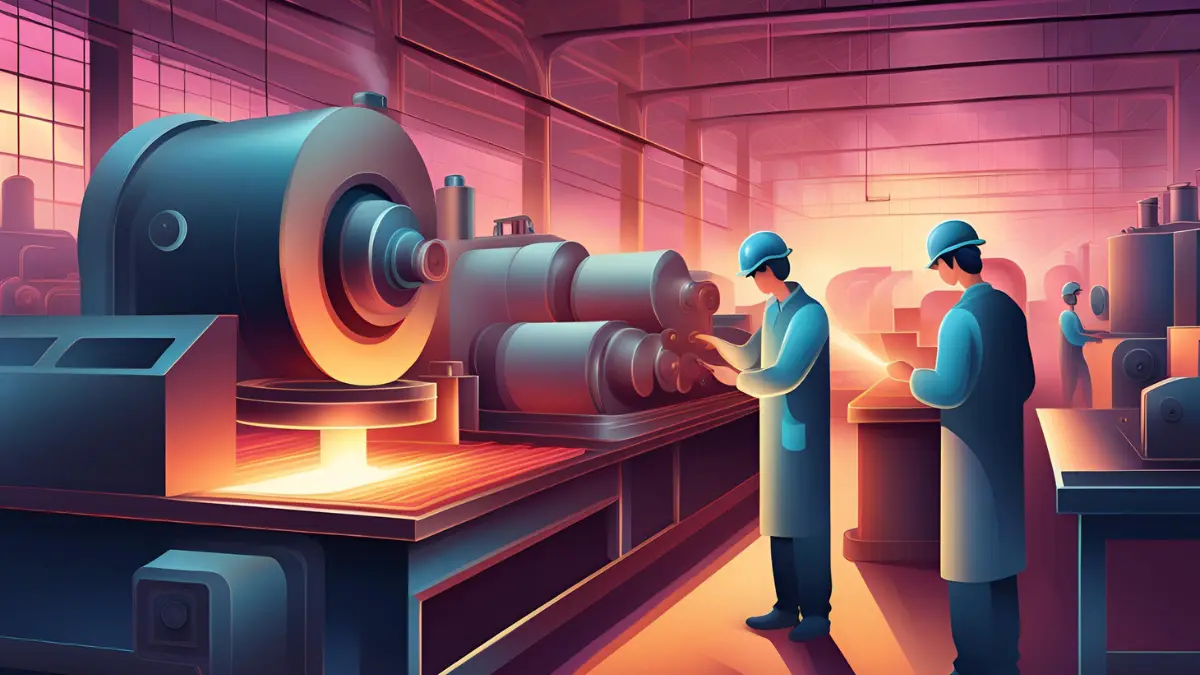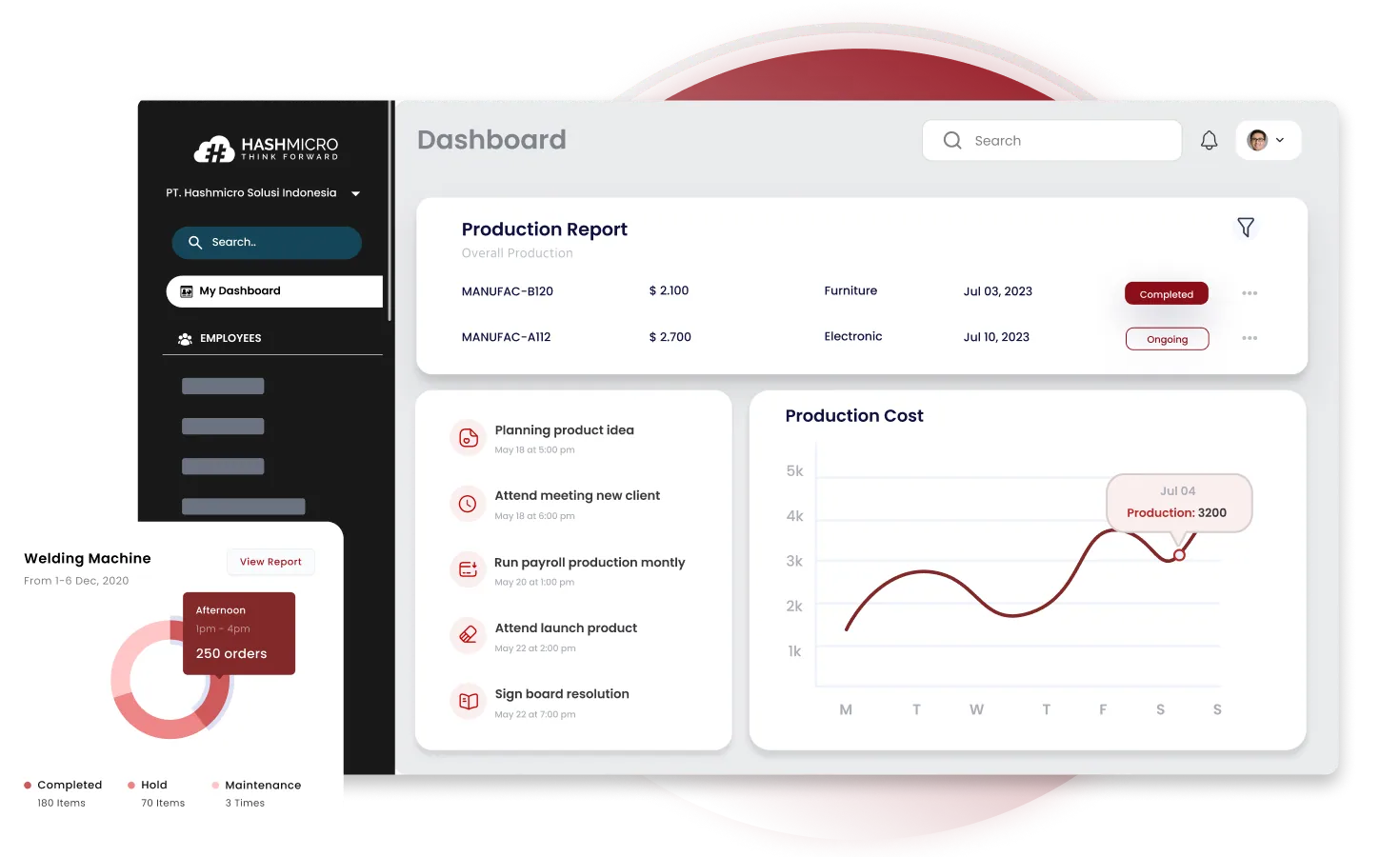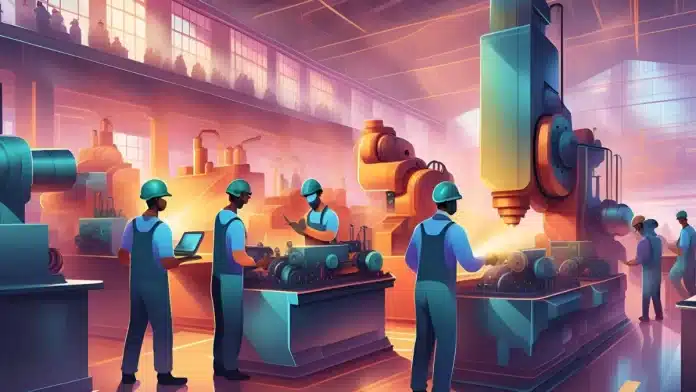Imagine the complexity of managing inventory, planning production schedules, and ensuring raw materials are always available without delays. A single miscalculation or inefficient scheduling can lead to production delays and skyrocketing costs.
A study in the Philippines revealed that companies leveraging AI in manufacturing saw a 25% boost in operational efficiency and a 20% reduction in production downtime. These figures highlight the transformative potential of AI in the manufacturing industry.
This article explores AI in manufacturing, its applications, benefits, challenges, and how businesses can implement it effectively. Keep reading to discover how AI is shaping the future of manufacturing and bakit ang mga solusyon tulad ng pinakamahusay na software ng pagmamanupaktura ng HashMicro ay mahalaga para sa tagumpay.
Key Takeaways
|
Table of Content
Content Lists
What is AI in Manufacturing?
Artificial intelligence (AI) in manufacturing is the application of artificial intelligence technologies, such as machine learning (ML) and deep learning (DL), to optimize production processes, improve decision-making, and enhance operational efficiency.
AI transforms manufacturing by enabling predictive maintenance, quality control, and supply chain optimization. For example, AI-driven systems can detect equipment issues before they cause downtime or forecast demand to optimise production schedules.
Need to know!
AI-powered manufacturing automates repetitive tasks, boosting productivity and precision. With Hashy AI from HashMicro, you can streamline operations, reduce human error.

Get a Free Demo Now!
The Impact of AI on the Manufacturing Industry
The use of AI in the manufacturing industry has brought big changes, making processes faster, smarter, and more efficient. Manufacturers can solve problems, improve operations, and get better results using AI technologies. Here are the key ways AI is making an impact:
1. Increased efficiency
AI helps automate tasks that used to be done by hand. Machines can now handle repetitive work, speeding up production and reducing mistakes. For example, AI-powered robots can assemble products quickly and accurately, making the whole process faster and more efficient.
2. Cost reduction
AI saves money by predicting when machines need maintenance and managing inventory better. It analyses data to spot potential problems before they happen, preventing expensive breakdowns. AI also helps keep the right amount of stock, reducing waste and saving costs.
3. Enhanced product quality
AI uses smart algorithms and cameras to find defects during production. It can spot tiny flaws that humans might miss, ensuring high-quality products. This means fewer defective items reach customers, improving satisfaction and trust in the brand.
How AI is Used in Manufacturing
The integration of AI in manufacturing has transformed traditional processes, making operations more agile, precise, and data-driven. By embedding AI into key areas, manufacturers can achieve greater control over production, ensuring smooth workflows and optimised performance. Several critical applications include:
- Predictive maintenance: AI-driven sensors continuously monitor machine performance, analyzing data to detect early signs of wear or potential failures. This proactive approach prevents unexpected breakdowns and extends equipment lifespan.
- Supply chain optimization: AI enhances supply chain visibility by predicting demand, managing inventory, and streamlining logistics. With real-time data analysis, manufacturers can reduce delays and ensure optimal stock levels to meet market needs.
- Generative AI in manufacturing: Leveraging advanced algorithms, generative AI accelerates product development by generating multiple design iterations. This technology enables manufacturers to test and refine innovations faster, significantly reducing time-to-market.
- Manufacturing Execution Systems (MES): AI-powered MES offers real-time insights into every production stage. From tracking work-in-progress to identifying bottlenecks, AI enhances process control, ensuring efficiency and consistency in manufacturing operations.
AI in manufacturing use cases
AI in manufacturing is revolutionizing processes, making operations more agile, precise, and data-driven. It enhances control over production, ensuring smooth workflows and optimized performance. Here are some notable AI in manufacturing examples:
1. Predictive Maintenance
AI-powered sensors track machine performance in real time, detecting signs of potential failure before they occur. This helps manufacturers fix issues early, reducing downtime and repair costs.
Example: Rolls-Royce uses AI to predict engine component failures, enabling early detection of potential issues. This helps minimize disruptions by allowing timely maintenance, resulting in smoother and more efficient operations.
2. Quality control and defect detection
Traditional quality inspections can miss subtle defects, but AI-powered computer vision systems can detect anomalies. These systems analyze products on the production line, ensuring only high-quality goods move forward.
Example: BMW utilizes AI in its production lines to inspect vehicle parts for imperfections with high precision. This ensures that defects are detected early, maintaining product quality. As a result, only high-quality vehicles reach customers.
3. Supply chain optimization
Managing complex supply chains requires real-time decision-making. AI forecasts demand, tracks shipments, and optimizes inventory levels to prevent stockouts or overstocking. It also streamlines logistics by identifying the fastest and most cost-effective routes.
Example: Unilever employs AI to streamline its supply chain by efficiently predicting demand and managing inventory. This reduces lead times and enhances logistics. As a result, raw materials and finished products are delivered promptly.
4. Generative Design for Product Development
AI algorithms can generate thousands of design alternatives based on predefined parameters, helping engineers identify the most efficient product designs. This speeds up innovation and enhances product performance.
Example: General Motors uses generative AI to design lightweight car parts, enhancing fuel efficiency while maintaining structural integrity. This technology allows engineers to create optimized designs that reduce material usage without sacrificing performance.
Benefits of AI in Manufacturing

AI is transforming the manufacturing industry by introducing innovative solutions that enhance operations and address critical challenges. Its impact is felt across the entire production lifecycle, from planning and execution to quality control and safety. Below are some of the key ways AI is benefiting manufacturers:
1. Automated Production Reporting
AI-driven systems generate real-time reports, tracking output, efficiency, and downtime while reducing human errors. Integrated with MRP (Material Requirements Planning) systems, AI aligns production data with material availability. This helps manufacturers quickly spot bottlenecks and optimize schedules.
2. Predictive maintenance for equipment optimization
AI-powered systems monitor equipment health in real time, analyzing data like vibration and temperature to predict failures. This enables timely maintenance, reducing unplanned downtime and repair costs while extending machinery lifespan. For example, AI can detect conveyor belt anomalies, preventing production halts.
3. Enhanced decision-making with real-time data insights
AI analyzes real-time production data, identifying trends and predicting disruptions to support swift decision-making. With AI-driven insights, manufacturers can respond quickly to market changes, optimize planning, and ensure smoother operations.
4. Quality control through computer vision
AI-powered computer vision systems inspect products with high accuracy, detecting defects like cracks or misalignments. Using cameras and deep learning, AI ensures only high-quality items move forward, reducing waste and maintaining standards.
5. Enhanced supply chain visibility
AI tracks raw materials and finished goods in real time, identifying potential disruptions and enabling quick corrective actions. For example, if a supplier is delayed, AI can source alternatives to keep production running smoothly.
6. Customized product manufacturing
AI analyzes customer preferences to tailor products, enabling mass customization. In the apparel industry, it designs personalized clothing, while in automotive, it configures vehicles to match individual tastes. This boosts customer satisfaction and creates new revenue opportunities.
Choosing the right AI solution for manufacturing enhances efficiency while optimizing costs. Flexible pricing gives you access to advanced features that streamline production processes. Click the banner below to explore our pricing schemes and find the perfect AI solution for your manufacturing needs.
Challenges of AI in Manufacturing
Despite its advantages, implementing AI in manufacturing comes with challenges. One major challenge is the high initial cost. Setting up AI systems requires significant investment in technology, infrastructure, and training, which can be a barrier for small and medium-sized enterprises.
Another challenge is the skill gap. Employees need training to work with AI technologies, and finding skilled personnel can be difficult. Additionally, data security is a concern, as AI systems rely on vast amounts of sensitive data that must be protected from cyber threats.
Finally, integration issues can arise when combining AI with existing systems. Manufacturers must ensure that AI solutions are compatible with their current infrastructure, which can be complex and time-consuming. Addressing these challenges is crucial for successful AI implementation.
How to Implement AI in Manufacturing
Integrating AI into manufacturing is not just about adopting new technology — it requires a strategic approach to ensure long-term success. Manufacturers can unlock AI’s full potential by carefully planning each step while minimizing disruptions. Here’s a step-by-step guide to effectively implementing AI:
-
Assess business needs
Identify the most critical areas AI can significantly impact: quality control, predictive maintenance, or optimizing supply chains. This helps set clear objectives and align AI adoption with business goals.
-
Identify key areas
Focus on high-impact processes like inventory management, production scheduling, or equipment monitoring. Prioritising these areas ensures that AI-driven improvements enhance efficiency and reduce operational complexities.
-
Choose the right tools.
Invest in the best manufacturing software that integrates AI capabilities. Look for solutions that offer features like predictive analytics, real-time monitoring, and automation. Ensure the software is scalable and compatible with your existing systems to avoid integration challenges.
-
Train your team
Equip your workforce with the skills needed to leverage AI technologies effectively. Provide training sessions on data interpretation, system integration, and new workflows to ensure smooth adoption.
-
Start small
Implement AI in targeted pilot projects before scaling up across the organisation. Testing AI in specific processes allows you to measure results, make adjustments, and build confidence before broader deployment.
Maximize Efficiency and Innovation in Your Manufacturing with HashMicro

Leveraging AI in manufacturing is crucial for enhancing productivity, minimizing downtime, and improving decision-making. HashMicro Hashy AI a comprehensive solution to revolutionize your production processes.
Designed to integrate seamlessly into manufacturing operations, HashMicro Hashy AI optimizes workflows, monitors production in real time, and ensures every process stage runs smoothly. With advanced automation and smart insights, businesses can achieve greater efficiency and stay ahead of market demands.
Here are the key features that make HashMicro Hashy AI the perfect solution for adopting AI in manufacturing:
- Predictive Maintenance: Identify equipment failures before they happen, minimizing downtime and optimizing production.
- Real-Time Production Monitoring: Track manufacturing performance instantly to detect inefficiencies and improve productivity.
- Task Automation: Automate repetitive activities like purchase requests (PR), leave approvals, and inventory updates, allowing teams to focus on strategic tasks.
- Supply Chain Optimization: Enhance logistics by predicting demand, managing inventory, and ensuring on-time deliveries.
- Smart Procurement: Automate RFQ (Request for Quotation) approvals, vendor selection, and tender management, streamlining procurement processes.
- Expiration Alerts: Get timely alerts for expiring materials, ensuring stock rotation and minimizing waste.
- Smart Reordering: Automate purchase requisitions for essential materials when stock reaches critical levels.
Conclusion
AI is revolutionizing the manufacturing industry by enhancing efficiency, reducing costs, and improving product quality. From predictive maintenance to supply chain optimization, AI empowers manufacturers to make smarter decisions and streamline operations.
HashMicro Hashy AI offers a comprehensive solution to help businesses harness the power of AI, providing advanced features like real-time production monitoring, task automation, and smart procurement.
Ready to transform your manufacturing operations? Try a free demo now and discover how HashMicro Hashy AI can revolutionize your business today!
Questions About AI in Manufacturing
-
What is the value of AI in Manufacturing?
AI enhances efficiency by automating processes, predicting maintenance needs, and optimizing supply chains. It reduces costs, improves product quality, and boosts productivity, making operations more agile and data-driven.
-
Is AI the future of manufacturing?
Yes, AI is shaping the future of manufacturing by enabling smart factories with automation, real-time insights, and improved efficiency. It drives innovation, making production more flexible and competitive.
-
What are the negative effects of AI in the manufacturing industry?
AI may lead to job losses, high implementation costs, and reliance on complex technology. If not properly managed, cybersecurity risks and system failures can disrupt operations.
-
What is the best manufacturing AI?
The best AI varies by need, but top solutions include HashMicro’s AI-powered ERP. These tools integrate with Manufacturing Execution Systems (MES) and Material Requirements Planning (MRP) to provide real-time data analysis, automate processes, and optimize production workflows, ensuring smooth and efficient operations.





































